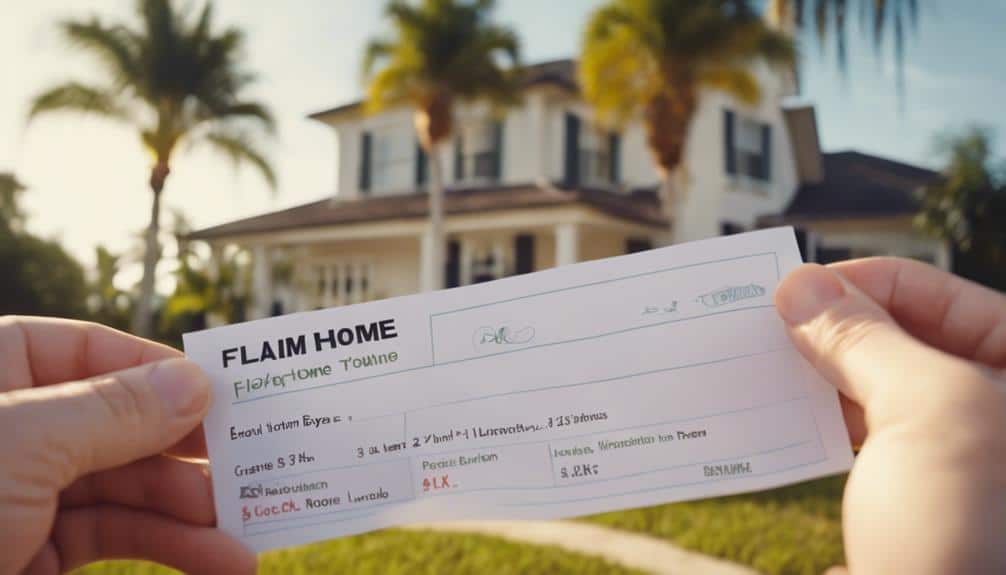Embarking on the journey of becoming Florida’s first-time homebuyers is a mix of excitement and challenges. Navigating the Sunshine State’s unique real estate landscape requires a strategic approach and an understanding of market trends, property taxes, and insurance intricacies. As we delve into six essential tips for Florida First-Time Home Buyers, we emphasize the importance of choosing the right agent and mastering the financing details. Thorough preparation is vital, as armed with the proper knowledge, prospective buyers are well-positioned to make informed decisions, ensuring a smoother shift into homeownership.
Let’s further examine these crucial considerations, shedding light on how they significantly influence the buying experience for Florida First-Time Homebuyers.
Essential Insights for HomebuyersKey Takeaways
- Choose an agent with local expertise to navigate Florida’s unique real estate market.
- Explore various financing options, including no-down-payment VA and USDA loans.
- Take advantage of the Homestead Exemption and understand county-specific property tax rates.
- Invest in comprehensive insurance, including flood and wind mitigation, to protect your Florida home.
Understanding the Market
Exploring the dynamic Florida real estate market requires a thorough understanding of the factors that influence it, including economic expansion, job creation, population growth, and fluctuating interest rates. The allure of the Sunshine State, bolstered by its warm climate and promising job market, has seen a surge in people moving from other states, thereby driving up housing demand. This influx, combined with the COVID-19 pandemic’s push for more spacious living and second homes, has significantly shaped the market landscape.
Florida’s real estate scene is poised for continued growth over the next 5-10 years, with economic expansion and job creation playing pivotal roles. However, potential homebuyers should note that home prices in Florida can vary widely depending on the city or region. Interest rates, while currently fostering an encouraging buying environment, can impact affordability and should be monitored closely.
Understanding these market dynamics is crucial for individuals seeking to belong in Florida’s vibrant communities. Whether seeking a primary residence or a second home, the current trends underscore a robust demand for Florida properties, making it an opportune time to contemplate investing in the Sunshine State’s real estate market.
Choosing the Right Agent
Selecting the right real estate agent is a pivotal step for new home buyers in Florida, requiring careful consideration of the agent’s expertise and ability to communicate effectively. An agent with a deep understanding of Florida’s housing market and neighborhoods, along with a proven track record of success, can significantly influence the outcome of your homebuying experience. Ensuring a match in communication style is crucial for a smooth and informed buying process, enabling you to make informed and confident decisions.
Agent Expertise Levels
Choosing the right real estate agent is a crucial step for prospective home buyers in Florida, as it can significantly impact the success of their property search and acquisition. When exploring the vibrant Florida market, the expertise of real estate agents becomes indispensable. Opt for agents with a robust understanding of local neighborhoods, an awareness of current market trends, and an extensive portfolio of successful transactions and positive client reviews. Such professionals are familiar with Florida’s amenities and boast valuable connections that can streamline the buying process. Their agent expertise guarantees that you are guided with precision and care, making your journey toward homeownership in the Sunshine State a rewarding and fulfilling experience.
Communication Style Match
A harmonious match between a home buyer’s and their real estate agent’s communication styles is pivotal for successfully maneuvering the complexities of purchasing a new home in Florida. Ensuring your real estate agent’s communication style aligns with your preferences is crucial to avoid misunderstandings during the homebuying process. Effective communication, characterized by active listening, clear conveyance of ideas, and regular updates, fosters a relationship built on collaboration and trust. This synergy not only smoothens transactions and expedites responses to inquiries but also enhances overall satisfaction with the homebuying experience. Additionally, transparent and open communication channels with your agent empower you to address concerns, negotiate effectively, and make informed decisions, ensuring a fulfilling journey to homeownership in the Sunshine State.
Financing Your Purchase
Exploring the various financing options in Florida is a crucial step for new homebuyers seeking to make a well-informed decision. Partnering with a knowledgeable real estate broker can provide invaluable guidance in maneuvering the complex landscape of mortgages and loans. Understanding the specifics of down payments, conventional loans, FHA loans, VA loans, and USDA loans, as well as the implications of private mortgage insurance (PMI), can significantly impact your financing choices and overall budget.
| Loan Type | Minimum Down Payment |
|---|---|
| Conventional | 3% |
| FHA | 3.5% |
| VA | 0% (No down payment) |
| USDA | 0% (No down payment) |
| No-PMI Conventional | 20% |
For many, the allure of conventional loans with a minimal 3% down payment presents a viable path to homeownership. In comparison, FHA loans require a slightly higher down payment of 3.5% but are more accessible to lower-income buyers. Veterans and active military personnel can benefit significantly from VA loans, which require no down payment —a feature matched by USDA loans, designed to encourage rural homeownership. Importantly, acquiring a conventional loan with a 20% down payment eliminates the need for private mortgage insurance, offering a significant saving over the life of the loan. These financing options in Florida open doors to prospective homeowners, providing multiple pathways to achieving the dream of home ownership.
Property Tax Insights
Understanding Florida’s property tax system, including its exemptions and amendments, is crucial for new homebuyers seeking to make informed financial decisions. The Sunshine State offers a Homestead Exemption for primary residences, which significantly reduces property taxes and makes homeownership more accessible. This exemption lowers the assessed value of your home for tax purposes and fosters a sense of belonging and community among Florida homeowners.
Florida property taxes are determined by the property’s assessed value, with rates varying by county. This system guarantees that your property tax reflects the fair market value of your home. However, for non-homestead properties, such as vacation homes or investment properties, be prepared for higher property tax rates, which can impact your budgeting for these investments.
The Save Our Homes Amendment is crucial for tax savings,, as it capss the annual increase in assessed property value for homestead properties. This amendment is a significant benefit, protecting homeowners from sudden spikes in property tax assessments and keeping homeownership costs manageable over time.
Insurance Considerations
After examining property taxes, another significant consideration for new homebuyers in Florida is navigating the state’s complex insurance landscape. The Sunshine State’s unique challenges, including the high risk of natural disasters, make understanding and selecting the right home insurance policies critical. Here’s what you need to know to guarantee your dream home is adequately protected:
- Flood Protection: Given that standard home insurance policies often exclude flood damage, securing additional flood insurance is crucial in Florida. This coverage is essential for safeguarding your property against the state’s frequent and sometimes devastating floods.
- Wind Mitigation Inspections: These inspections can significantly reduce insurance premiums by proving your home has been reinforced against wind damage. Implementing wind mitigation measures demonstrates to insurers that your property is less prone to risk.
- Sinkhole Coverage: Florida’s geological vulnerability to sinkholes necessitates this additional coverage to protect against potentially catastrophic property damage.
- Actual Cash Value vs. Replacement Cost Coverage: Understanding the distinction between these two can significantly affect the insurance payouts you receive for repairs or replacements. Opting for replacement cost coverage might be more expensive upfront, but it can offer more comprehensive protection in the event of property damage.
Maneuvering Florida’s insurance rates and coverage options guarantees your investment is secure, providing peace of mind in a state known for its weather-related challenges.
Legal and Regulatory Aspects
Understanding the complexities of Florida’s legal and regulatory landscape is crucial for new homebuyers to ensure their property rights and investments are secure. Exploring property ownership in the Sunshine State encompasses a broad spectrum of considerations, from beachfront regulations to deed restrictions that can significantly influence your living experience. Familiarizing oneself with zoning laws and homeowner association rules is not just advisable; it’s essential for ensuring that your dream home does not become entangled in legal disputes that could have been avoided.
Equally important is understanding state and local regulations regarding property taxes and insurance requirements. These financial obligations can affect your long-term budgeting and should be carefully evaluated before purchasing a home. Consulting with a real estate attorney is a proactive step that can provide peace of mind by thoroughly addressing all legal aspects of the buying process. Staying informed about changes in Florida real estate laws and regulations is imperative to safeguard your homeowner rights. Considering these legal and regulatory aspects, you’ll be better positioned to make a well-informed decision, securing not just a property but a place where you truly belong.
Frequently Asked Questions
What’s the First Thing You Should Do When You Buy a New House?
Upon acquiring a new house, it is advisable to prioritize changing the locks to guarantee security. This initial step safeguards your home, offering peace of mind as you move into your new residence.
What Do I Need to Buy a Home for the First Time in Florida?
To purchase a home for the first time in Florida, a good credit score (around 620 or higher), understanding of loan types, pre-qualification, and working with a knowledgeable real estate agent are essential steps.
How Much Do Florida First-Time Home Buyers Have to Put Down as Their Own Payment?
Dipping your toes into the Florida housing market, first-time home buyers can expect to put down as little as 3% for conventional loans, 3.5% for FHA loans, and 0% for VA and USDA loans.
What 3 Things Should You Be Aware of When Buying a House?
When purchasing a home, it’s essential to consider property taxes, insurance costs (particularly for natural disasters), and the legal aspects of the property, such as beachfront regulations, to ensure a wise and secure investment.
Conclusion
As a first-time homebuyer, you may find buying a home in Florida to be a daunting process. It’s essential to recognize that numerous expenses are associated with home buying, including the mortgage, closing costs, inspection fees, property taxes, and homeowners’ insurance. To achieve your homeownership goals, you must determine your price range and monthly payment based on your income, credit scores, and other eligibility requirements. You may also want assistance from a real estate agent or mortgage lender to help you navigate homebuying.
You have several loan options for the mortgage, including conventional, FHA, and VA loans. To get pre-approved for a mortgage, you must provide your lender with a credit report, income documentation, and other financial information. You’ll also need to decide on the type of mortgage, such as a fixed-rate or adjustable-rate mortgage, as well as the mortgage term. Remember that you’ll need to pay upfront costs, such as the down payment, closing costs, and mortgage insurance premiums, which can add up to thousands of dollars.
Before making a final decision, research the Florida real estate market, including the median income, purchase price limits, and market rates. Review the inspection report and the homeowners’ association fees before making an offer on a property. Additionally, you may be eligible for payment or cost assistance programs, such as Florida’s Housing First-Time Homebuyer Program or the Federal Housing Administration’s HFA Preferred program. Remember that homeownership is a significant financial decision, and making informed choices that align with your financial situation and long-term objectives is crucial.







